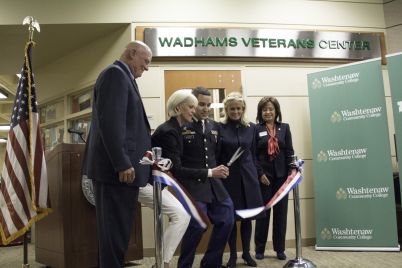By Brittany Dekorte
Editor
Five years ago, Washtenaw Community College counselor Kim Grose had an idea.
“I wanted to bring people together, and the best way to do that is food,” said Grose. “I had been growing food for thirty years, and I wanted to share that.”
It was from that idea that the WCC CORE Garden was born. CORE, or campus orchard rejuvenating energy, was given financial support by the college, and space to build its hoop house behind the entrepreneurship center. The hoop house, a half round structure of piping and white, heat trapping cloth works as a greenhouse and season extender for the crops grown.
Since 2014, the garden has grown vegetables and herbs as part of their focus to provide fresh produce to underprivileged WCC students. Aimed at teaching people where their food comes from, farm-to-table cooking was also an objective. Grose designed and taught classes on farm harvesting and management to culinary students.
Anastasia Baumgardner was one such student who took the class and continued on to volunteer at the garden.
“Right now we have tomatoes, radishes, other root vegetables. The kale will last all winter,” Baumgardner said. According to Baumgardner, the garden produced 700 pounds of food this season alone, and all was given away for free at farm stands to WCC students and their families.
“We’ve been lucky enough to have four good seasons,” Baumgardner reflected.
Four good seasons, because the CORE Garden is officially done. The original funding put forward by the school’s general fund is being discontinued, and placed under new management: the Washtenaw Technical Middle College.
“It’s a different plan, right now,” said Grose. “There will be a biology teacher running it, teaching hands on, and there will be entrepreneurship classes.”
The garden will still be growing from February to November, as it has been, but many changes are planned under WTMC management. Instead of culinary, food-to-table based classes, biology classes will emphasize teaching processes of plant growth and botany.
The biggest change though is what is going to be done with the food grown. Rather than giving away the food for free to underserved community members, WTMC students will take the fruits of their labor to local farmers markets to sell while learning how to run a business.
CORE’s last day was Thursday, Oct 19. Grose and Baumgardner held a goodbye event, offering snacks and painting pumpkins with those who had volunteered and utilized the garden over the years. One drop-in was Dale Petty, a professor at WCC who is also on the school’s sustainability council.
“I helped put up this hoop house,” said Petty. “And we were really hoping for more of a program. Many community colleges around the state have sustainable farming programs, and we were hoping for one at the school but it never came. I would love to see it expand under WTMC, though.”
For Grose, saying goodbye to the garden is bittersweet, to say the least. This was her big project, and now it’s coming to a close. She will still be counseling at WCC, but doesn’t have another project on this scale planned.
“It’s a great idea for the students, learning about business, but I’m sad to see the community support going.”

